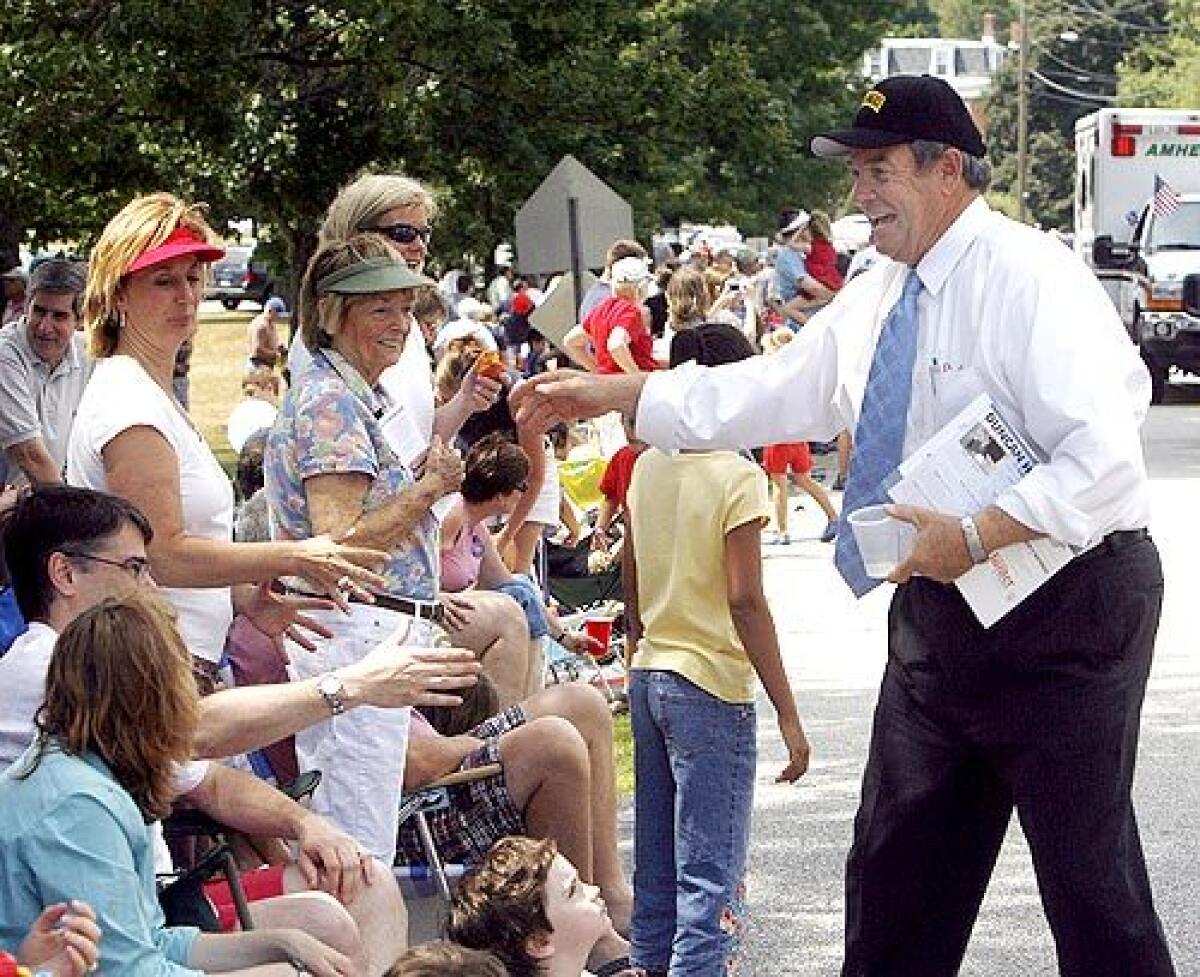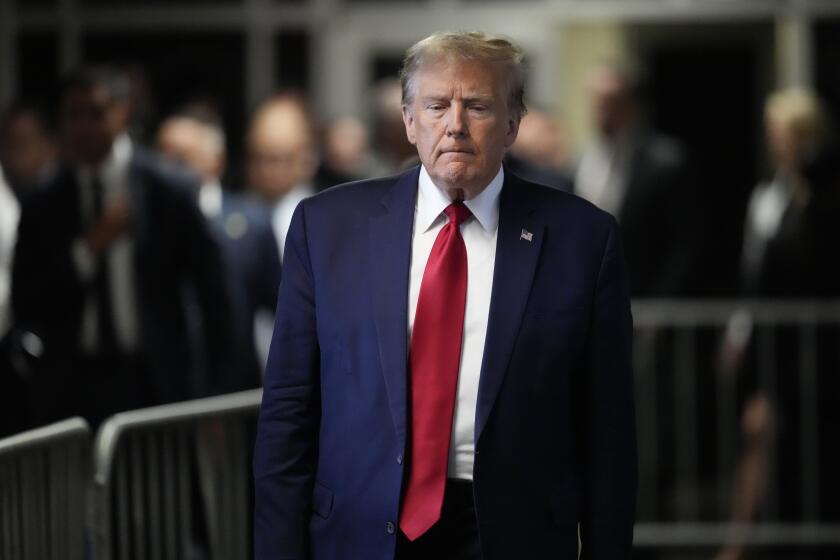Duncan Hunter’s toughest fight yet

MERRIMACK, N.H.- — Duncan Hunter had already spent an hour serving scrambled eggs at a Rotary Club pancake breakfast and walked a mile in the nearby Amherst Fourth of July parade, and was now more than halfway through another parade in this old farm town on the west bank of the Merrimack River.
Hunter, a 14-term congressman from El Cajon in San Diego County, strode from one side of the road to the other, waving, shaking hands and introducing himself. It’s a polite crowd; most wave back or take the proffered hand. A few thank him for coming. Fewer still say they’re pulling for him.
Caught up in delivering the speed-date version of his platform — tougher border security, strong defense and reviving the American industrial base — Hunter, 59, falls behind the middle-school kids carrying his banner. As he hustles to close the gap, someone yells out, “Go on ‘The Daily Show’! We’ve never heard of you.”
It’s a funny moment, but also a telling summation of Hunter’s campaign — a little-recognized name trying to catch up with a fast-moving parade.
Despite being the former chairman of the powerful House Armed Services Committee, where he developed a reputation for never meeting a weapons system he didn’t like, Hunter barely registers in national election polls. Over the first six months of the year, his campaign raised about $1.2 million, only slightly more than the amount Hunter spent getting reelected to Congress in 2006.
Hunter has virtually no organization in Iowa, where organizing is key to caucus success. His New Hampshire team is eight volunteers, and campaign fundamentals get missed: Although Hunter is starved for media coverage, during a two-day visit here the campaign failed to tell the only reporter tracking him that the second day’s itinerary had changed, sending the reporter and Hunter to cities 45 miles apart.
So why is Duncan Hunter giving up one of the safest Republican House seats in the country for what can generously be called a longshot bid for the White House?
Because, Hunter says, he thinks his time has come.
“All the issues that I care about, that I’ve worked on my entire career, have come to the fore,” Hunter said, citing immigration, national security and an economy that “is fracturing with a massive exodus of manufacturing jobs” to other countries.
And like so many other candidates, Hunter found an open door too inviting to resist. With President Bush termed-out and Vice President Dick Cheney not interested, “this is one of the few truly open races for the U.S. presidency in the last 50, 60 years,” Hunter said. “I’ve got a chance to win.”
Not many share his optimism — and lack of cash and name recognition are only part of his challenge.
In a nation that tends to float along the middle of the political river, Hunter paddles almost exclusively to the right. He still supports Bush’s now-unpopular decision to invade Iraq and to stay there until Iraqi forces can take over. He opposes abortion in all cases and supports a constitutional amendment to ban same-sex marriage.
He and the rest of the country are closer on immigration. Hunter takes credit for legislation authorizing the initial border fence south of San Diego, and he pushed the measure extending the fence to the Gulf of Mexico — which nearly two-thirds of respondents to a June NBC News/Wall Street Journal poll said they approved of.
And Hunter’s concerns about the erosion of middle-class jobs touch on the personal anxieties of countless Americans.
But Hunter’s biggest issue — and his family’s legacy — is defense. The son of a World War II veteran, Hunter served in Vietnam, and one of his sons, also named Duncan, joined the Marines after the Sept. 11 terrorist attacks and did two tours in Iraq. Now a reservist, he was recently called up and is deployed to Afghanistan — service that Hunter mentions at nearly every appearance.
But it is possible to be too close to the military, and the defense industry. Hunter accepted campaign cash from some of the same people allegedly involved in the $2.4-million bribery scandal that sent his friend and protege Rep. Randy “Duke” Cunningham (R-Rancho Santa Fe) to prison. Hunter later announced he had turned the contributions over to charities. He has not been accused of wrongdoing himself.
Yet when most politicians would try to distance themselves, Hunter has stayed true to his friend. Last week, he described “Duke’s fall” as a “tragedy for our country.” Hunter was in the courtroom in March 2006 when Cunningham was sentenced to more than eight years in prison after pleading guilty to federal conspiracy and tax-evasion charges.
“I brought Duke into politics. I held Duke’s first fundraiser,” Hunter said, sitting on a low wall outside Merrimack High School as he awaited a post-parade ride.
“He was my friend; he is my friend,” Hunter added. “I think that as Christians, if we can forgive our enemies, we can certainly forgive our friends. So I didn’t run away from Cunningham.”
Hunter’s own use of budget “earmarks” to steer money to defense projects the Pentagon has not wanted — such as L-3 Communications’ Sea Fighter catamaran supply vessel, and duPont Aerospace’s DP-2 vertical-takeoff aircraft — has raised questions about the congressman’s loyalty to contractors.
But it’s a chicken-or-egg issue. Does Hunter get financial support from defense contractors to ensure his vote for their pet projects, or does he attract defense donations because he is predisposed to backing experimental projects that he says are key to military innovation?
“A lot of them fail, but a few of them break through,” Hunter said in June, testifying before the House Science and Technology Committee’s subcommittee on oversight. “The ones that break through prove of great value.”
Now Hunter is hoping for his own breakthrough in what has become an all-or-nothing gamble. Hunter has said he will not run for reelection to the House seat he first won in 1980 on Ronald Reagan’s coattails.
“I think that your campaign has more validity if you don’t keep a foot on the lily pad,” Hunter said. His Marine son has announced that he will try to succeed his father, but the campaign has been delayed while the son serves in Afghanistan.
Hunter shrugs off questions that his presidential campaign is a final grab at the gold ring before he retires from politics and possibly moves into the private sector.
“If I get a chance to be president of the United States,” Hunter said, “that will be a pretty good day job.”
It’s a big “if.”
To win, he has to build name recognition and support. Yet on the campaign trail, voters barely mask their indifference.
Last week, Hunter — wearing a blue apron over his long-sleeved dress shirt and tie — took up a spot on the serving line at the Merrimack Rotary Club’s annual pancake breakfast. During the slow moments, he introduced himself to diners moving down the cafeteria line. “I’m Duncan Hunter. I’m running for president. I need your help — and I got the eggs.”
But mostly he was just another volunteer at a small-town ritual. Hunter found one fan in the crowd — Lance Kuntzman, 35, who drove about 10 miles from Manchester because he heard Hunter would be at the breakfast.
“He’s one of the more authentic conservatives running on the Republican side,” Kuntzman said. But even then, Hunter is Kuntzman’s second choice, behind former House Speaker Newt Gingrich (R-Ga.) — who hasn’t declared that he’s running. Still, a chance to meet Hunter and have a snapshot taken with him was hard for Kuntzman to resist.
“I admire him for coming out here,” Kuntzman said. “This is the place to be seen.”
Or the place to be overlooked. Later in the day, more than halfway through the Merrimack parade, Hunter walked over to one side of the road and was greeted by a throng of youngsters — who turned away when they realized he wasn’t handing out candy as many of the other paraders were.
Unfazed, Hunter fell back into the parade, chatting with middle-school volunteers marching behind his banner.
--
scott.martelle@latimes.com
More to Read
Sign up for Essential California
The most important California stories and recommendations in your inbox every morning.
You may occasionally receive promotional content from the Los Angeles Times.











